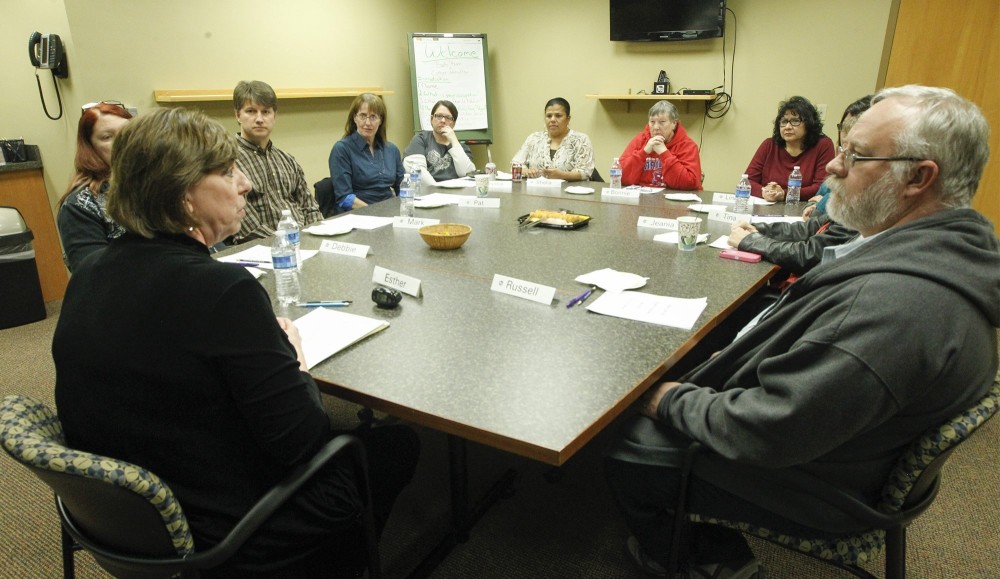By Dan Voorhis
The Wichita Eagle
Bobby Gandu sat in the dark, chin resting on hands, eyes focused, taking a beating.
The admissions director at Wichita State University and several staff members were listening to a focus group of parents talk about what they liked and didn’t like at their campus tour.
There was a lot not to like, apparently.
“The tour was a make it or break it thing, and it broke it,” said one parent of her child’s decision on which college to attend.
They sat in a special room at the Research Partnership, a 31-year-old market research company on the 18th floor of Wichita Executive Centre.
The room has a large mirror along the wall. Behind that one-way mirror lies a row of seats, used by clients to observe.
Focus groups are an important piece of market research, and a big part of what the Research Partnership does.
It tries to answer clients’ big questions: What do you think of the business or organization? What do you think of the product or service? Will you buy it? How much? What would make it better? And most important: How do I sell to you better?
It’s intelligence gathering, but instead of learning the secrets of the enemy, it’s learning the perceptions of customers and potential customers.
The methods vary greatly, but there are two big categories: qualitative, which is more anecdotal; and quantitative, which can be statistically generalized to an entire population.
Research Partnership partners Bob Ross and Esther Headley use focus groups to gather perceptions about whatever they’re testing, from a new Coleman cooler to recruitment strategies for Big Brothers Big Sisters.
Focus groups can be a starting point, depending on how much the client wants to spend. They provide insight into which questions to ask on surveys, questionnaires, polls and other large-scale statistically valid methods.
“We’re searching for common themes,” Ross said of the focus groups. “Something we can use when and if we move to designing survey questions.”
Market research can be shockingly revealing.
Robin Mishler, the firm’s research director, said participants in one focus group were asked to evaluate the prototype for a new kind of camping product.
Over and over, they said they would never buy such a product, couldn’t see the reason for it. Staff from the company that developed the tool sat behind the mirror growing more and more glum.
“I could see one of the engineers drawing a line back and forth on a piece of paper,” she said. “Then he said, ‘Well, there goes two years of my life.'”
There aren’t many firms based in Wichita that do market research. One of them is Sullivan, Higdon & Sink, the big advertising and marketing agency based in Wichita and Kansas City.
While the Research Partnership is a traditional market research firm that works on a contract basis, SHS integrates market research into its advertising campaigns.
It provides intelligence on whether existing advertising is still working and how new campaigns should be shaped.
But the firm has also elected to develop its own proprietary research, which it dubs FoodThink, to bolster its expertise in food-related advertising.
This independent research, company officials said, bolsters its credibility in making suggestions to clients.
“It’s not a data dump, it’s analysis, it’s here’s what it means,” said Christy Niebaum, senior brand strategist for SHS.
These research projects, called white papers in the industry, cover such topics as how mothers affect which foods are bought and how they are prepared, and how shoppers are changing in the age of mobile communications.
Market research can make advertising more effective, Niebaum said.
When SHS staffers were rethinking the campaign for Cargill’s Angus Farms brand, they drew on their FoodThink research to shape the campaign that features stories about the farmers and ranchers who produce the beef because they are better liked and trusted than giant food conglomerates.
“They like to hear the narratives,” Niebaum said. “It helps consumers feel more connected to the brand and the product.”
Gandu must have a thick skin. Despite having his WSU campus tours criticized, he’s not offended.
He understood Headley and Ross were soliciting criticism, and he said he’ll put what he heard alongside all of the other focus groups and surveys he’s seen.
Good or bad, it’s all useful in figuring out how to improve, he said.
Besides, most of the focus group said that, overall, they were excited about WSU and liked the visit, even if they had specific gripes.
Gandu’s boss, Barth Hague, WSU’s chief marketing officer, also sat in on the focus group.
It pays to get beat up now and then, even if you don’t think it’s right, he said. WSU is also in the business of selling to the general public.
“We may or may not agree with everything said here, it doesn’t matter, that’s their perception, and it’s perceptions that are real.”














































































































































































































































































































































































